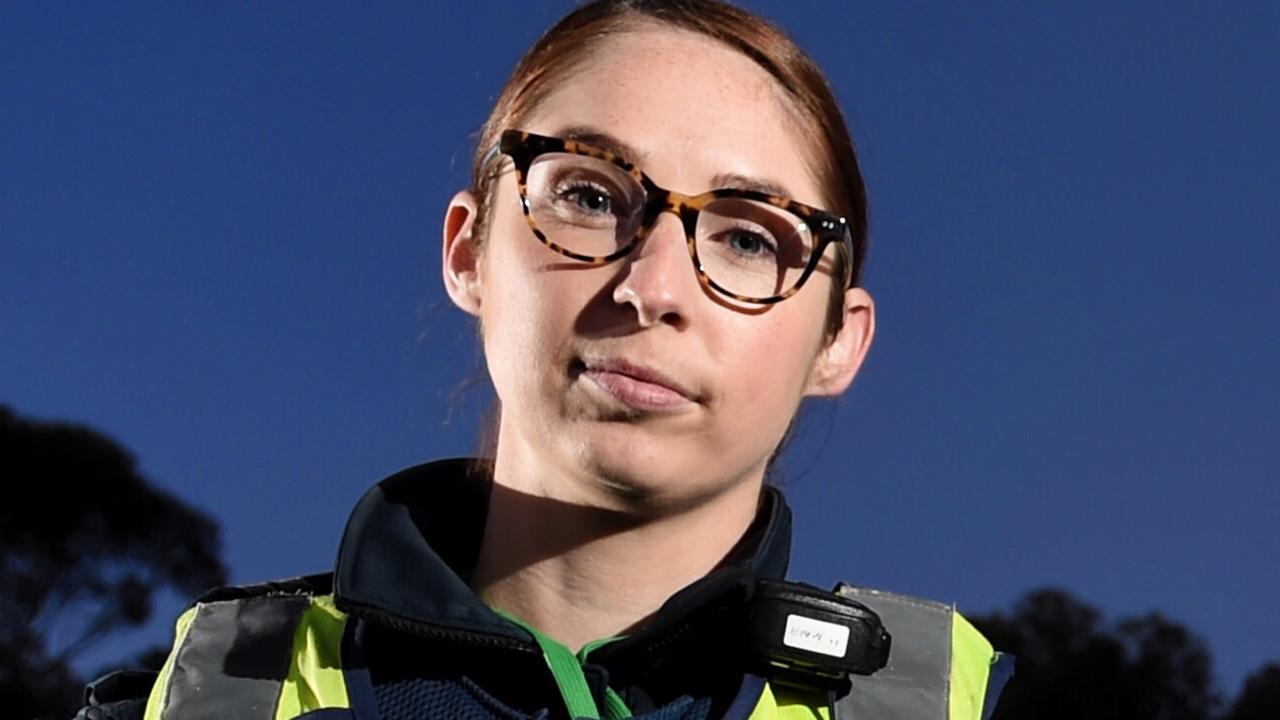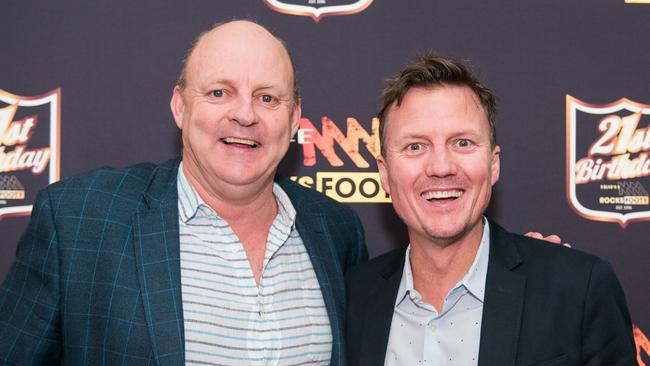Hamish McLachlan: Grant Hackett opens up about failed marriage, domestic violence claims, rehab, trashing his Melbourne apartment and his return to pool
GRANT Hackett has revealed why he trashed his luxury apartment, in an explosive interview in which he comes clean about his personal battles, addiction and domestic violence allegations.
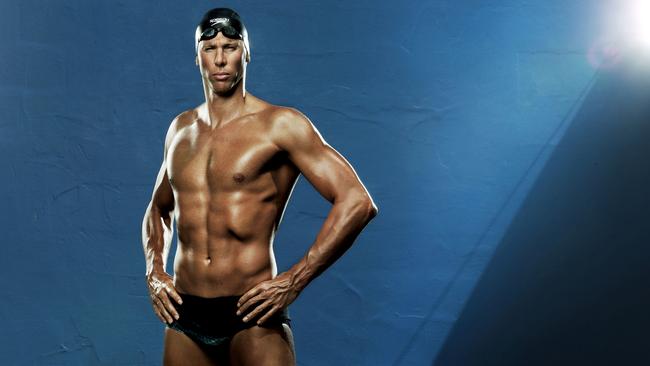
VIC News
Don't miss out on the headlines from VIC News. Followed categories will be added to My News.
GRANT Hackett has done what very few people could ever dream of doing in the pool. He was a hero at the Sydney Olympic Games. Athens too. And almost won his third 1500m gold in Beijing. Since retirement, Grant has had his share of personal battles. We met poolside after training on the Gold Coast last week. He spoke openly about his return to the pool, his failed marriage, dependency, domestic violence allegations, rehabilitation and missing his kids.
HM: The 2000 Olympics. When you touch the wall first, what are the emotions?
GH: That was probably the biggest highlight of my career, I was only 20 at the time, so winning in front of a home crowd against an idol in Kieren Perkins was unbelievable. Kieren was like the Don Bradman of our sport. I remember watching him at Barcelona in ’92. It was the dream scenario, racing in our own country, in the most medalled event for our country. I hit the wall, I’d won and I thought — life really can’t get any better. But it did! The guy that put the medal around my neck was a man I really admired, Johann Koss, the speed skater who won four Olympic gold medals with a heap of world records. My parents were there in the crowd. It was a pretty amazing set of circumstances that will never happen again.
HM: Unbeaten in over 10 years, and your life goal was three consecutive Olympic golds in the 1500m … how did falling short by 0.69 of a second affect you post Beijing?
GH: It was obviously a difficult result, particularly after such a strong heat swim that would’ve won the event, but there is little I could do about it. I had a poor race strategy and it compromised the outcome, but that’s my fault, and I can live with it.
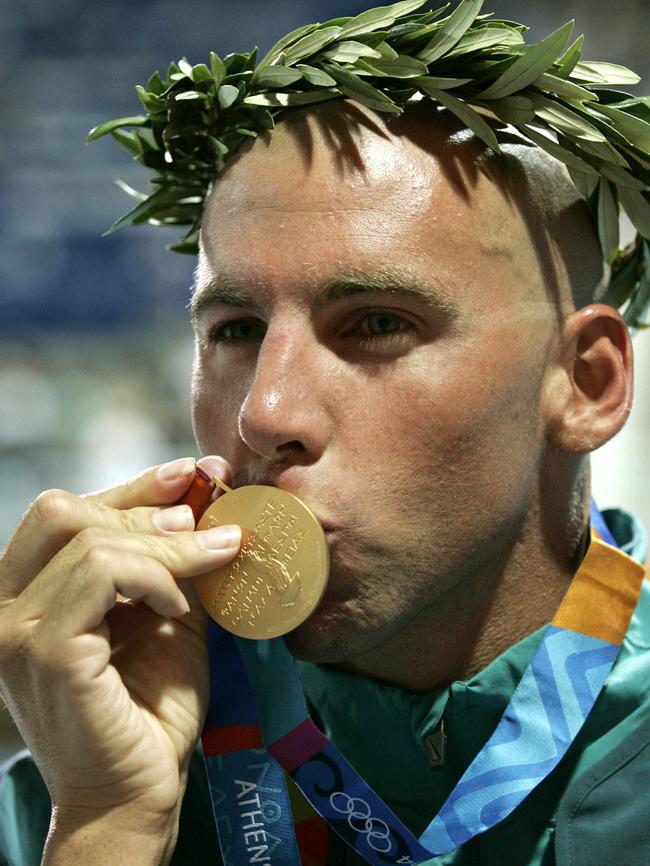
HM: Was your return to the pool supposed to be anything other than therapeutic, and an exercise to help you piece your life together?
GH: It wasn’t even that really, as I actually felt that when I got to the stage of getting back into the pool, my life was already back together. I felt I was in a really good space, I was getting really fit, I was starting to enjoy life again. The business things that I’ve been doing were going well, so I actually felt like I’d spent many months getting everything back together.
Getting back into the pool was just a decision that I made to get even fitter. I had been doing a fair bit of gym work, and getting fairly strong. I had just been to the Pan Pacs here on the Gold Coast and thought to myself, “Geez it’d be nice to go for a swim”. I hadn’t felt like that in over six years. When I finished the sport I didn’t think there would be any way I ever wanted to see that black line again! I was scared of the bathtub!
HM: So you are fitter, your competitive, you’re absolutely uncertain as to what is next, and you are enjoying it?
GH: Yes, I really enjoy the swimming and the training, and I love the racing. What I have found the most difficult part in all of this, as I always have, is the media attention. Even though I spent 20 years in the spotlight, I’ve always found a huge amount of attention overwhelming. For me the most difficult thing in coming back is dealing with the attention, all the interviews coming your way. A lot of it has been nice, don’t get me wrong, but I wasn’t doing it then, or now, for the attention. I did find that I had to build a bit more resilience to be able to handle all that. The external stuff is something that I need to be really conscious of. To make sure it doesn’t get to me. It’s also about how I conduct myself as well, I get that.
HM: How do you feel you transitioned post swimming?
GH: I feel I transitioned with relative ease to be honest. I was happy to move on from sport, and I had a plan in place that I had developed five years out from retirement. I had studied, and I was committed and really excited to be commencing a new career that I was passionate about. Which is contrary to public perception and the opinions in the media that speculated that my undoing was due to my retirement as a professional athlete and not transitioning well. My undoing was due to my personal life and my marriage failure, nothing to do with my professional career ending, or some sort of identity crisis. I was happy to put swimming behind me, and I was excited by the thought of some new and different challenges.
Question: Have you ever physically harmed Candice or the kids? Answer: No. Never. Ever. No one has ever been physically harmed. No one has ever been touched, not a hair on a head.
HM: You have been heavily criticised in recent years surrounding your private life — there’s still a lot of reputational damage. There’s always two sides to every story — you have seemed very quiet with yours.
GH: It has been complicated. There has been layers of complexity, given the nature of certain events and legal orders that have been enforced by various courts along the way. The processes are, rightly, very protective of children. As a result, certain things have had to be contained. It is regretful in many ways as a 360-degree view of all the issues and all sides would promote more transparency and understanding, and perhaps provide a more balanced view for those that have followed the whole situation.
HM: You didn’t speak much following the well-documented night in your (Southbank) apartment. Public perceptions were formed, almost entirely against you.
GH: At the time of the photos hitting the paper, I was restrained by orders and injunctions that prevented me from speaking to the media, or mentioning my children in anyway. So I was hamstrung and couldn’t clarify a lot of the rumours and speculation, which was extremely frustrating and something that people just didn’t, or couldn’t, understand. My barrister and legal counsel made it very, very clear that the consequences of breaching the order would have made things even more dire for me, which is something I didn’t need at that time, particularly when I was having so much trouble coping with the stress of the collapse of my life. At the time I was prevented from seeing or speaking with my children, and seeing them again was my priority. You are a father Hamish, imagine not seeing your kids for 78 days! It is hard, it is very, very hard. And as a result, you wouldn’t say anything or do anything to jeopardise that.
HM: You were also widely criticised after the 60 Minutes interview for not saying sorry when you had the opportunity to.
GH: I think that no matter what I did there was always going to be some media opinion pieces that were just going to hem me in. I did say sorry, but there is an editing process in those stories. I was sitting there for an hour and a half or so and they cut it down to about 11 minutes. Of course I said sorry. Of course I am sorry, how could I not be? What sort of person would not be sorry in that situation? I was horrified with what happened that night, I still am. I can’t believe I got into that headspace. I have never been anywhere near there since, and I can’t believe I got there, and don’t understand how I could get back there again! That’s how I feel about that 10-15 minutes of my life. In that interview, I was embarrassed, I was sorry, I was regretful. I had hurt people and disappointed people. I’d hurt my family. It was upsetting for everybody and of course I was sorry, and I will always be sorry. It’s something I never want to relive again, but it’s something I have to relive all the time.
HM: Sorry to whom?
GH: First and foremost, sorry to Candice. And my children. And my family. I feel like I let them all down so badly. They try to bring you up to be a certain way, with a certain set of values and principles, and you let them down. It then trickles down to your friends. I also felt sorry for the Australian public, because they trusted me; I’d represented the country successfully for well over a decade, I was the captain of one of our major national teams. I felt like I owed an apology all the way down the line. I am sorry to all of them, still. Always will be.
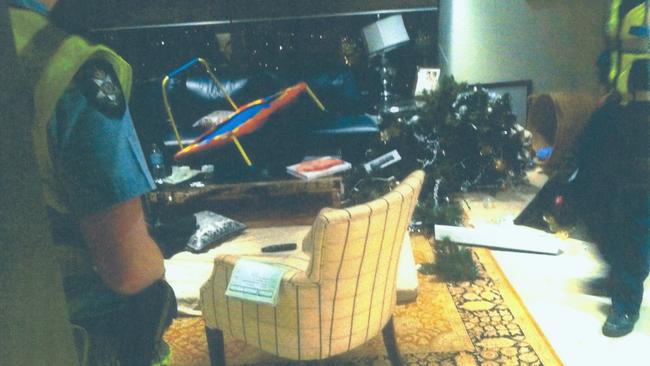
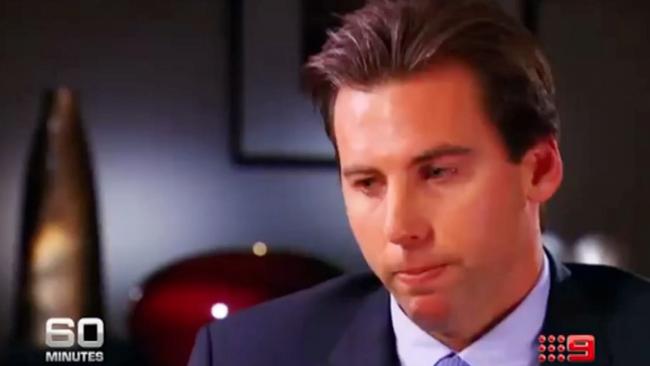
HM: Derby Day 2012 — why did you destroy your own apartment that night?
GH: I was at the lowest point of my life, and I made a mistake. I think a lot of people get into marriages that are most likely not going to last. I was in one of those, and it was coming to an end. When you are at that point, you do feel a sense of obligation as a family man to stick in there and endure everything coming your way, even when it’s making you seriously unhappy. I wanted the marriage to end, but I couldn’t walk out on my children. I was at a point where I was looking for the least resistant path. I was gutless. You don’t want to leave your kids, and in the end you hope the decision will be made on your behalf. I went out of my way to act so a decision would be made on my behalf. Some people go out and commit adultery in the hope to get caught. I guess my weak act in all of it, was rather than make the decision myself, was to trash parts of the apartment. I thought if I did that, the decision would be made on my behalf, and therefore it would be a guilt-free way of achieving this. I know there is no excuse for what I did, and I will be sorry, and I will regret it until the end of time. However, sadly, it happened, and I am trying to move on with my life. I won’t let my life deteriorate to that point again, and have learnt so many difficult lessons. I felt very weak and ashamed of what I did that night, and I broke so many of my personal values and principles, which in itself was extremely destabilising for me. In its simplest terms I was weak and cowardly, and I regret it, and I am extremely sorry for the harm I have caused. But at the end of the day, that was my reasoning. Whether people like that or not, it is what it is.
HM: So your actions were essentially made in order to get Candice to end the marriage so you didn’t have to?
GH: Yes. Sadly that is the truth, and I’m not proud of it.
HM: Were you unhappy for a long time?
GH: I think to get to that point, I must have been. I was. It was years of build-up. I can’t speak for Candice, but she probably felt similar things. You just get to that point where the unhappiness just manifests itself so much within, that you just don’t know what to do. At some point that all has to come to a head, and you can make some really poor decisions. And I did.
HM: Why didn’t you come clean on what happened that night rather than deny it, and say things were great?
GH: Good question! Candice and I spoke about it at length. Our marriage was struggling very much at the time, and I was traumatised and feeling extremely guilty for my actions. I thought I owed it to Candice and the kids to give things another shot. We both agreed that the last thing our relationship needed was public pressure from the events of that night. It was our matter to deal with, and it would’ve compounded the difficulties and stress at that point in time. It was a mistake in terms of media relations, but seemed like the right thing for our marriage, and our family, at the time. I’ll always remain accountable for my actions, and will never hide from what I did. However, the sensationalism of the account of that evening is very difficult to deal with. It was definitely one of the bigger mistakes along the way.
HM: Do you think the public perception is that you physically hurt Candice and, or, the kids that night in your apartment?
GH: I think it’s mixed. I think some people know there is a lot of crap in there and that the media sensationalise things. It’s funny, in the articles you would see the word “alleged” used multiple times, and then at the bottom of all the articles you would read the Victorian Police had not pressed any charges. I’ve never touched anybody.
HM: For clarity — have you ever physically harmed Candice or the kids?
GH: No. Never. Ever. No one has ever been physically harmed. No one has ever been touched, not a hair on a head.
HM: There were articles written that the kids were cowering in the corner, watching you destroy your apartment. Are they true?
GH: How many times have I heard that. Candice’s parents lived in the same building. The kids were both asleep in their rooms when I came home. Candice and I did argue. Candice took Charlize downstairs to her parents through the service door next to her room. I didn’t see Candice again for the rest of the night. When she left all I had damaged were the photos in the hallway. Both Candice and her mother came back upstairs, but only Candice’s mother came into the apartment and asked me to calm down. She realised how upset I was, and then asked me to go and get Jagger so they could take him downstairs. Jagger was asleep, but I took him out of bed, and back to Candice’s mother at the front door. I was stressed, upset and sad my life was unravelling, and only then did I create the majority of the carnage that everybody has seen in the papers. Candice called the police with her mother from the hallway. Shortly after 2am police knocked on my door, and thereafter four to six more police arrived. The police can verify that no one was hurt and that absolutely nobody else was in the apartment when they knocked on my door.
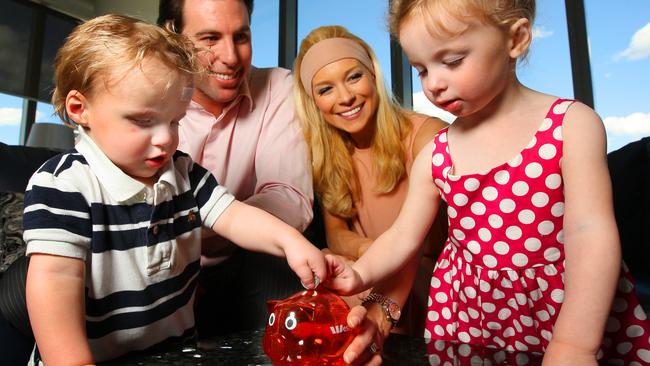
HM: How is your relationship with Candice now?
GH: Candice is the mother of my children. There are always challenges after divorce, but we are working on our relationship being positive and always in the best interests of the children.
HM: And your kids?
GH: They are beautiful kids, and there is nothing more important in the world than those two little midgets.
HM: I imagine it’s hard to be apart from them?
GH: It’s something you just can’t get used to. It’s something that I never thought that I would have to live with. I talk to them all the time, and see them as much as I can to let them know that I am there for them regardless, but it’s a real challenge, and it’s certainly not easy.
HM: Must be hard reading allegations that aren’t true?
GH: It is because it starts out as “alleged”, and everything is up in the air. Then the police investigate and they don’t charge you. So it’s like, how much more truth can you get than that? But then at the end of the day, because you had “alleged” in there all of a sudden it’s a better story if it’s true, and all of a sudden it becomes “truth”. I was literally reading this stuff and my heart was just breaking. For someone to actually write that is the most horrifying thing, it is horrendous. A lot of that stuff sends you to dark places. It’s all right if someone accuses you of something trivial — you can just say whatever, and brush that off, but when it’s put on the front page of the newspaper for the whole country, or the whole world to read, that’s difficult to digest. Not everybody is going to like me, I may not be everybody’s cup of tea, that’s fine. I’m comfortable with that, but at least know the honest truth about me before you form your opinion, please. And that’s what’s really difficult, when there is so much misdirection and misleading journalism out there. You read articles and half of it is made up. Have they rung the police? Have they even rung Candice? Have they rung anyone who knows me personally to corroborate the story? No, but they have an opinion, and are published.
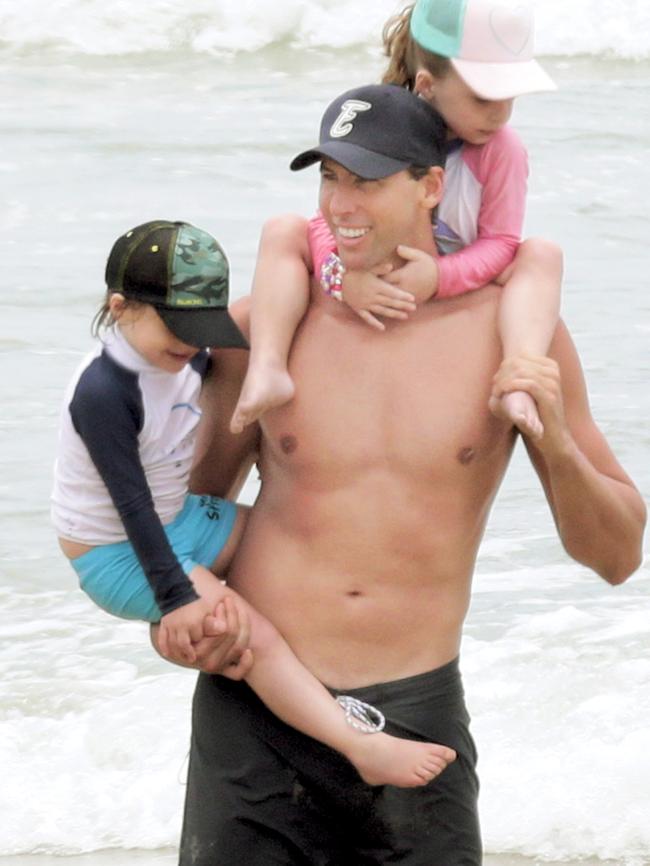
HM: What have you been charged with?
GH: Nothing. I’ve never been charged with anything. The most difficult thing to digest is thinking that I actually harmed someone or that my kids witnessed me destroying the apartment that night. That for me has been the single most destabilising thing in the whole journey of the last three or four years. And I still have to live with it. Every time I come back and do something, whether it is super positive or not, no matter how people view what I just did, it will always hook into something like that. And that for me … well it just hurts.
HM: You went to the US for addiction. What were you treated for in the US?
GH: I am in a good enough place now to say that it was a rehab facility and I was treated for insomnia, and a dependency to sleeping tablets and prescription medication brought on by the events we have spoken about. However, the treatment really examines your entire life and provides you with answers to why these events take place, and how to effectively manage them in the future. It wasn’t as simple as snapping out of it or stopping being weak. Using sleeping tablets or having any other disorder is simply a byproduct of the problem, not the problem itself. I needed to uncover this and treat it effectively. There are many complex layers to it, and it took a lot of hard work, trust and effort to get myself out of that dark hole.
HM: Why did you start taking sleeping tablets?
GH: I started taking them during my swimming career as they were introduced by the team doctor. You have to understand that you compete over multiple days in multiple events, and then post those events you have the medal ceremony, drug test, cool down, massage and a press conference, and you don’t often get to sleep until well after midnight. And then you have to back up, and race the next morning. This is where Stilnox came in as it allowed you to fall asleep, wake up without a hangover effect, and get on with competition. No one’s to blame for this as it was understood by all competitors, both domestic and abroad, to be the most effective strategy. However, the side-effects and consequences weren’t known, not to mention the dependency it can create if you’re a poor sleeper, and have to rely on yourself physically for a living. Rest and sleep were key for recovery. Post swimming, in the stressful times, I resorted to Stilnox to sleep as well, and that is when it started again.
HM: Did you become addicted to sleeping tablets?
GH: I am not sure of the medical terms, but there is no doubt that I certainly went through periods where I was dependent on them and, towards the end, things were worsening. I was living on my own for years and I think that sort of disguised the problem and my own personal handling of the situation.
HM: Did you ever lie about your use of them?
GH: I didn’t lie about it as I was honest when it was coming out in the papers in 2012, but I didn’t feel it was necessary to go into the detail of my dependency. I couldn’t come to terms with going to rehab initially. I had lied to my manager (Chris White) on a number of occasions. He is a close friend and he knew something was wrong, he was on to me and I went about things the wrong way. On my return from America I apologised profusely. I was embarrassed and ashamed in front of my family, and didn’t want the whole world knowing. I was already coping with enough and didn’t want to have to go through it in the public domain. Once I went through the treatment, I realised that it was a lesson in understanding yourself, and an opportunity for a huge amount of personal growth. I became proud of the fact I was taking on my demons, to be honest. We all have a darker side to us, and once I came out, I wanted to encourage people that weren’t managing in their lives to not be afraid, like I was, and to take things on, as tough as that may be. In a sense, I learnt to become proud of that instead of being ashamed like I felt initially.
HM: Did you have a drinking problem as well?
GH: I never had a dependency on alcohol, and over the years only used alcohol as a form of celebration, and would rarely drink. However, as the pressure of everything compounded in my personal life and I felt it becoming unmanageable, it did become a form of escape, and I didn’t always use it for the right reasons. I probably got myself into a state that wasn’t great too often, and feel embarrassed and am apologetic.
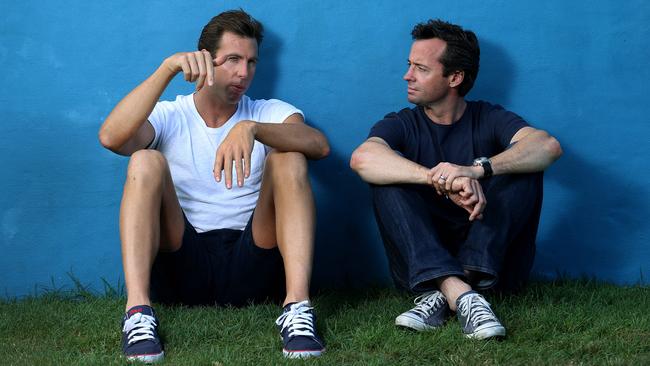
HM: How would you describe your mental state at the time of it all?
GH: Exhausted, tired, embarrassed and ashamed. I felt pretty hopeless, yet, I always felt a strong sense that I could come out on the other side stronger and better for all these difficult experiences. At times I certainly doubted myself, but I never lost my sense of self-belief. I knew I had to dig deeper than ever.
HM: With everything that you’ve been through and done, is there one great regret?
GH: I do regret that night of Derby Day. Massively. A lot of people say that they have no regrets because it turns them into the people they are today, but I do feel like there are a few things that I could have missed along the way and still ended up the same person I am today! That’s my huge regret.
HM: What have you learnt through it all?
GH: I’ve learnt that I’m human, and I am totally imperfect. I’ve learnt I have to manage my emotions much more effectively when I get into difficult and stressful situations. As an athlete and then a businessman, I had always been able to handle stress, so I think I thought I would always be able to just keep absorbing it. I was wrong, I learnt that. The stresses, combined with all the personal and public laundry that was being aired, was too much for me, but I tried to cope on my own. And I coped badly! Given my capacity to handle things historically, people assumed I would be fine, as I always put on a brave face. Underneath it all though, it wasn’t the case. Given my profile, I found it really difficult to ask for help, and I am a private person by nature. I learnt that was wrong. I’ve learnt it is a matter of constantly utilising my support network whenever I go through challenging periods, and never being afraid to ask for help. Life doesn’t have to be like an Olympic 1500m freestyle. I am now continually looking at ways to grow and take care of myself, and continually trying to balance the pendulum. Everyday I’m now conscious of this. It has been difficult to come back into the media spotlight through swimming and be reminded of the past, as it puts you out of balance. But having awareness and resources around this will make it much easier for me now, and in the future, I hope.
HM: You once said you wanted to have a healthy happy family, world peace and a never-ending packet of Tim Tams. The last two will be hard, but I hope you find the first.
GH: I hope so Hamish. I’d like to think I will, that Candice will, and that our kids will. Thanks.

